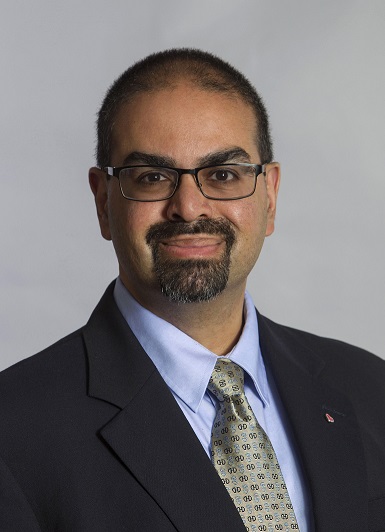Ankush Gosain, MD, PhD, FACS, FAAP, associate professor in the University of Tennessee Health Science Center Department of Surgery and director of Pediatric Surgery Research at the Children’s Foundation Research Institute of Le Bonheur Children’s Hospital, has been awarded a $785,220 grant to continue research for the treatment of a birth defect that can affect the colon of newborns. The grant is funded by the National Institute of Diabetes and Digestive and Kidney Diseases.

“This project came from the patients that I saw during my pediatric surgery training,” Dr. Gosain said. “Before that, during my PhD work, I became really interested in the idea that the nervous system and the immune system can interact and influence each other’s behavior. I had studied that interaction in the skin, as part of wound healing, and how the nervous system controls immune cells and how that impacts healing.”
Dr. Gosain and his lab, along with his mentors, Drs. Ken Kudsk, Miles Epstein, Will Burlingham and Chris Coe, are investigating a possible link to Hirschsprungs Disease (HD), which occurs during development of the enteric nervous system and gastrointestinal mucosal immunity. HD is a birth defect where nerve cells are missing from the end of a child’s bowel. It occurs during development when the enteric nervous system, or the “brain of the gut,” doesn’t form properly because nerve cells stop migrating earlier than they should. Since the nerve cells are missing, stool does not pass through the bowel normally, causing blockages.
Currently the treatment for children with HD is with a surgical procedure that removes the part of the digestive system that does not have nerve cells, and then connects it to the part that does. However, up to 60 percent of patients develop a life-threatening infection called Hirschsprung-associated enterocolitis with symptoms such as fever, diarrhea, and even shock.
Dr. Gosain’s lab is testing whether the deletion of a protein coding gene, EdnrB, alters developing immune cells and whether it causes defects of immune function. His lab will also determine the contribution stress has on the development of immune response. In the last few years their results have started to explain why babies might develop enterocolitis.
“I think the most exciting part of this research is that our lab and other labs have really changed how the field thinks of this disease,” Dr. Gosain said. “For the longest time, everyone thought the problem in enterocolitis was this part of the intestine that didn’t have the nervous system, and that once you get rid of that, the problem of enterocolitis goes away and the kids are normal. What we have found is that the “normal” intestine isn’t normal and still has problems. Fundamentally beyond Hirschsprungs Disease, this is giving us information on how the enteric system, or brain of the gut, works together with the immune system. That impacts how we think about irritable bowel syndrome, food allergies, and more conditions. So this research has the potential to impact the treatment of many other diseases.”
The project, which is in its third year, is titled “Gastrointestinal Mucosal Immune Defects in Hirschsprungs Disease.” A yearly total of $157,044 will be distributed over five years.
